

Baby Bedding
One of the most exciting aspects of preparing for a new baby is organising their nursery. Thinking about where your baby will eventually sleep, and what they are going to sleep in, takes some planning and discussion. Practical factors, such as the size of your house and the number of children you have or want, will determine whether the new baby will have their own room, or will need to share with an older sibling. There is too much individual variation in families and homes to say what the best option is. Parents generally make their own decisions based on what will work in their home and what suits their own family.
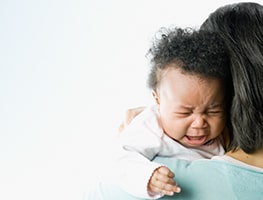
Baby nightmares
When a baby wakes up suddenly from sleeping and is in distress, parents often try to work out the reason why. Sometimes it’s clear what’s wrong but at other times it can be a bit of a mystery. One theory is that it could be due to nightmares, which cause your child to wake in fright. The sight of a crying, clearly distressed baby is enough to make any parent’s heart melt, especially when, until moments before, they were sleeping calmly.
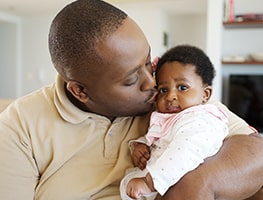
Baby Not Sleeping
For a process so essential and natural, sleeping is something a lot of babies just aren't very good at. Babies often need their parent's help to learn how to go to sleep and then stay asleep for a reasonable length of time. Well-rested babies, who have regular routines of sleep and wakefulness, tend to be more content and easier to care for.
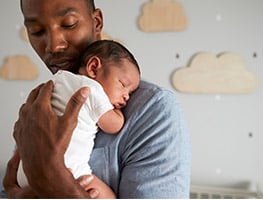
Baby settling
Some babies settle to sleep easily and don't need much help from their parents. Others are a little more resistant and need soothing and persuasion to calm down and drop off to sleep. For lots of babies, staying asleep for longer than a few minutes is something they need to learn.
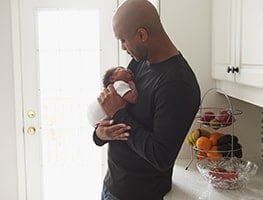
Baby sleep help
In the early days after having a baby, excitement and joy energises parents. Attending to their baby's cares and making sure every little want and need is covered is a pleasure. Soon though, continually broken sleep combined with meeting constant demands, can lead to tiredness and feelings of exhaustion. Parents start to long for the chance to have some quality sleep themselves.
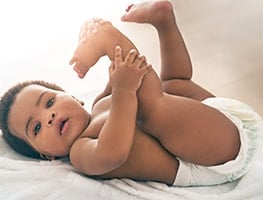
Baby Sleep Information
Newborn babies sleep almost 16 hours a day so, naturally, sleep is one of the most import aspects of your baby's early development. Developing a healthy routine that works for you and your new baby is important. Huggies can help guide you in creating good routines and sleeping patterns for your baby so that you and your baby get as much rest as possible.

Baby Sleep Patterns
In a 24 hour period, newborn babies generally sleep for 16 to 18 hours, and this happens at regular intervals during the day and night.

Baby sleep problems
Every baby comes into the world with a unique mix of genetics and a personality that separates them from others. Yet despite their differences there are some universal needs that have to be met, to grow and reach their potential. Sleep is one of those essential requirements. Yet, for something so important and basic to good health, why do so many babies resist what should just come naturally?

Baby Sleep Routine
Encouraging your newborn baby to sleep is a process of elimination. It is a process by which you try to eliminate most factors that prevents them from sleeping. As you gain confidence, you will be able to help deal with your baby's normal behaviour and when he is trying to settle (fall asleep).
Sometimes it can take a newborn up to an hour to achieve deep sleep and it is good to know that, even after you have attempted to remove all negative factors, the behaviour and unsettledness your baby is experiencing is quite normal.

baby sleep tips
Do you ever feel like your baby is the only one in the world who doesn’t know how to go to sleep? Do you ask yourself, “What I am doing wrong?”, “What else can I try?”, and most importantly, “When can I go to bed?”

Baby sleeping habits
The first few weeks of a baby’s life are a time of major adjustment. We focus so much on the inevitable changes for parents that sometimes we forget just how much babies have to adapt as well. It is unfair to expect them to have predictable, regular routines of feeding, sleeping and wakefulness in the early weeks. But, still, we can be very quick to label babies as “good” or “bad”, based on how much they sleep.

Baby swaddling
Swaddling is a practice that has been used for centuries, and is one of our most commonly used methods to help calm and soothe young babies. There are many benefits to swaddling, or wrapping, and although it can be a little difficult to manage at first, it is worth trying.

Bedding and linen buying guide
As the bed is the centerpiece of most children’s bedrooms, bedding presents a great opportunity to inject a little colour and fun into the space. It is your choice whether to go for graphic geometric and retro-inspired prints, or you could make a statement with bright, colour-blocked linen, patterned neutrals, or classic flowers, blocks and stripes.

Choosing the safest cot for baby
"Beautiful designs, patterns, colours, bedding and trims are important, of course, but what really counts is your baby’s safety.
Let Huggies help you with some important information about what to look for in a cot, and how to ensure it is set up safely for your sleeping beauty. "

Controlled cying
Controlled Crying had its early origins in the Truby King era, when it was believed parents needed to regimentally control their baby’s routines of sleep and feeding. It was thought that a crying baby was a healthy baby, who was just exercising their lungs and letting off steam.

Ferberization
American paediatrician, Dr. Richard Ferber, wrote the book, “Solve your Child’s Sleep Problems”, in the mid-80s and has been credited with improving the sleep of millions of children. A revised edition published in 2006 acknowledges the changes in our understanding of children’s sleep.

Parents coping
Sometimes a baby refuses to settle to sleep, no matter what the parents try. It can be really hard to put in a lot of effort and do the best you can, without any signs that it's working. From childhood we learn about cause and effect and how our actions translate into outcome. It's no wonder then, that we can feel frustrated and confused when hours of soothing and comforting don't seem to make a big difference.

Safe baby sleep
Making your baby's cot is a simple, quick task you do every day; but remember that how you make it is really important. Use the following guidelines to ensure your baby is as safe as they can possibly be.

SIDS
SIDS is short for 'Sudden Infant Death Syndrome', which used to be called 'cot death'. It means the sudden, unexpected death of a baby from no known cause. SIDS is the most common cause of death in babies between one month and one year of age. Most babies that die of SIDS are between 2 and 4 months old, with more babies dying of SIDS in winter than in summer.

Sleep Associations
Sleep associations are not just limited to babies and young children. Even as adults we have certain requirements that need to be met before we can drop off to sleep. Although some are very individual and dependent on circumstance, most of us have a fairly consistent set of prompts that let us know it is alright to go to sleep. Lights out, pulling up the covers, placing our head on a pillow, listening to music, the list goes on.

Sleep deprivation and parenthood
As a parent you will usually hear lots of facts about the “average baby” sleeping sixteen and a half hours a day. This figure has been brought about by including babies that sleep 9 hours, and those who will sleep for 21. The fact is, every baby is a unique little individual, and developing regular sleep cycles is something that will take time and patience in resolving. The key is for parents to stop blaming themselves for the fact that their child doesn’t sleep all night or settle well at bedtime.

Sleeping through the night
Of all the topics parents love to discuss, one of the most popular is that their baby is “sleeping through”. This is generally seen as such a milestone of development that all efforts in working towards it are worthwhile.













